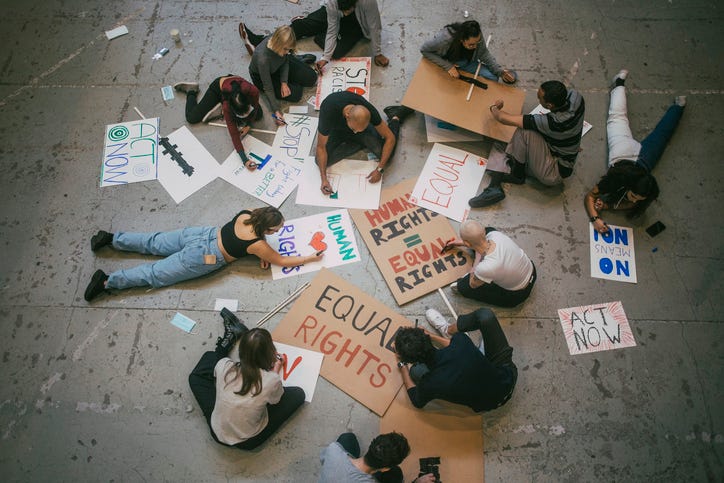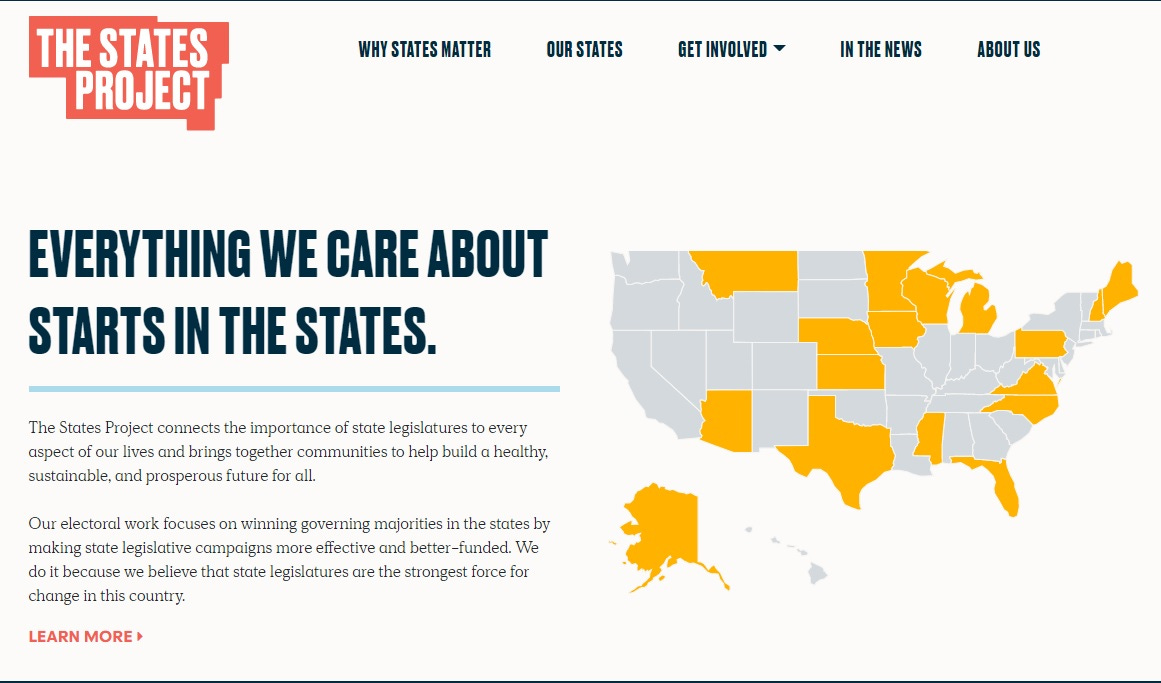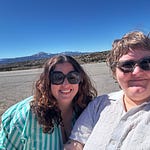These are the folks who are going to a state capitol and deciding whether to expand Medicaid or deciding whether there’s one abortion clinic left in the state or deciding whether there’s LGBTQ protections for folks on the job. It’s wild that there aren’t more eyes on it, but it’s not the way we’re trained.
Welcome to Burnt Toast! This is the podcast where we talk about diet culture, fat phobia, parenting and health.
Today I am chatting with Melissa Walker, who is the head of Giving Circles at The States Project. This is a little bit of an unusual episode for Burnt Toast! I know you come here for the analysis of diet culture and anti-fat bias, but today we’re gonna save democracy. I am so excited to launch the Burnt Toast Giving Circle, which will raise money to flip state legislatures in battleground states.
If you have been in a rage about the state of our country and you want to do something about it, I am hoping this will be your thing! Because together we can have a huge impact. I’m setting a goal that our can raise $10,000 — which is 1,000 Burnt Toast listeners giving ten bucks each. There are a lot more than a thousand people who listen to this podcast and read this newsletter. So even if you’ve only got five dollars or two dollars to give, please join us. And if you want to give more, that is great, too. (And keep listening, we’ve got more ideas for how you can get even more involved.)
Episode 34 Transcript
Virginia
When I think about the political issues that are keeping me up at night, it’s stuff like: What’s going to happen when we lose Roe? Why did Build Back Better fail so spectacularly around paid family leave and child care? What is happening in Ukraine right now? Thinking nationally about politics is how I’ve been trained to think about politics. So, let’s start by helping people (me) understand why does state government matter so much?
Melissa
State governments have really been overlooked for a very long time. When I started looking into this work, which honestly was in late November 2016, I started to understand that most folks don’t really know who their state representatives are. When I looked up who my state senator was, I had never heard of him. I did not have eyes on the people going to Albany for me. I started to understand that everything that I was worried about, and everything that I cared about, in terms of our country was actually being controlled in state legislatures and not in Washington, DC. State legislatures are in charge of everything from environmental policy to education funding to gun safety to healthcare to civil rights.
They’re also in charge of the very core of our democracy: Voting rights are decided state by state. State legislatures decide whether to suppress or expand voting. They have the power to gerrymander. They are drawing the district lines that decide who goes to the state legislature, who goes to Congress, who goes to Washington DC.
So I started to see that there were all these kitchen table issues being decided in state legislatures and that they were also incredible tools of federal power. A lot of things started to make sense to me that hadn’t before. I started to think about things like my home state of North Carolina, where the bathroom bill passed, and I started to understand that lawmakers in Raleigh did that. Things like the Stand Your Ground gun law in Tallahassee that let Trayvon Martin’s murderer go free (and then passed in 25 other states)—that was lawmakers in Florida, and then in those other states. And in Flint, Michigan, I realized, oh, that’s a Lansing problem. That’s not a Washington DC problem.
Virginia
This is blowing my mind. Why do you think we are so trained to focus on Washington? Why am I now having this epiphany? Why don’t we think about states?
Melissa
Well, it’s complicated. There are really 50 mini Congresses in this country and they’re deciding things state-by-state. These are local races. They do not get national attention. The truth is that there is someone who’s been paying attention to state legislatures and it’s the radical right. They’ve been organizing for state legislative power for a very long time. From 2010 to 2016, we lost nearly 1,000 state legislative seats. And in those states where Republican majorities took over, people’s lives got bad. They defunded education. They put in right to work laws. They gutted environmental protections.
And when people’s lives got bad, they didn’t say, oh, that must be my state senator, I’m gonna go down to Main Street and talk to them, because they have an office there (because they do). Most people don’t know who their state senators are, even maybe that they have one. So they blame what they could see on what they hear about on the news every day, which is Washington DC, often the president, sometimes something about Congress. The roots of Trumpism were being seeded in state legislatures. It’s a body that operates in darkness and it really has been overtaken by special interests.
Virginia
It makes me think a lot about the role of the media here. You and I both come from journalism and those headlines are always Washington-based. Local media is so decimated right now. Local newspapers are so underfunded, and non-existent in so many places, that they’re not able to play that crucial role. And I mean, how many times as a national magazine editor did you say, “That story is too local, that’s not going to be interesting to our national readers.?” It happens all the time.
Melissa
When we hear “Oh, Texas just passed this law limiting abortion,” people say, “Well! That Ted Cruz is terrible.” And this law has nothing to do with Ted Cruz. This is lawmakers in Austin who are in the state legislature and they only officially have session every two years. Something that people don’t know about state legislators is that in 40 states, it’s a part time job. It pays very, very little. These are the folks who are going to a state capitol and deciding whether to expand Medicaid or deciding whether there’s one abortion clinic left in the state or deciding whether there’s LGBTQ protections for folks on the job. This is where this stuff has been decided. It’s wild that there aren’t more eyes on it, but it’s not the way we’re trained.
Virginia
For those of us who live in blue states, why should we care about the laws in other states?
Melissa
Well, states are meant to be laboratories for democracy. Like marriage equality going from state to state to federal or healthcare going from Hawaii to Massachusetts to becoming the ACA. They really are meant to be incubators of good policy, ideally. Right now, a lot of states are incubators for voter suppression bills and bans on choice and bans on trans kids playing sports. Those laboratories for democracy should not be allowed to be laboratories for autocracy.
We should also care about state legislatures because they are immense tools of federal power. As I said, state legislatures in most states have the power to draw the district lines that decide who goes to Congress. So they are promoting their own party in many cases in the drawing of those lines and making it so that the folks in power at the federal level are coming from from the party of their choice. They also control voting laws. So if you care who wins the presidency, you should care whether votes are limited in certain states or not.
The last thing I’ll say is, if you care about the Supreme Court, you should care about state legislatures. Because the Supreme Court does not write laws, they rule on laws, many of which are written in state legislatures—sometimes explicitly written in state legislatures to rise up and challenge a Supreme Court ruling, like in the case of the Mississippi law that’s currently challenging Roe v. Wade.
Virginia
This feels like something we should have been covering in 10th grade social studies and we definitely didn’t.
Of course, some of my listeners are going to be like, “Why are we talking about state legislatures on a podcast about diet culture?” So we’re going to connect those dots for everyone right now. Yes, this is a podcast about anti-fat bias and diet culture, and there are a lot of reasons why people don’t realize how political those issues are. You know, we think in terms of body positivity and body image and we don’t think enough about ending weight discrimination, which is absolutely a legal and social justice issue. And a really great example of the potential of state legislature is Massachusetts, which right now as we’re recording this, has a bill pending that would prohibit size discrimination. That’s one of the first places in the country that would be formally legislating against fatphobia.
I’m curious if that’s at all on your radar. As you said, states are incubators. So is this the place where we could be getting this work done?
Melissa
Although we know that federal law does prohibit employers from firing employees on the basis of race, color, age, gender, religion, or national origin, those laws don’t provide any protection for weight discrimination, even though obviously, there’s plenty of evidence that it’s a real phenomenon. And that’s also true for LGBTQ+ discrimination—federal law does not protect against that, but certain state laws do. Many states have made progress on that front. But so far, the only state that I found that has an explicit law on the books that forbids discrimination and employment based on weight is Michigan. So Michigan has a law that passed in 1976. It also forbids discrimination on the basis of age and height, but that is the only state at this point that has that on the books. I believe Massachusetts would be the second.
Virginia
Well, way to go Michigan! There was some amazing fat activism happening in the 70s and I’m guessing a lot of those folks were in Michigan and got that done. And I guess the point we want to make here is that another reason to be focusing on state legislatures is that there’s real potential for this issue to get traction in states with your state senator down on Main Street, where you can go have a conversation about this, as opposed to ever getting this issue to have traction in Congress.
Melissa
Looking up who your state reps are, knowing them, and then making them people you that you talk to and really engage with and advocate with is a great thing. State reps will take your call. They will take your meeting. They are not as busy as your federal reps, and they are interested in having an engaged voting bloc—or they should be. You have a lot of influence there.
I’ll also say that this is a method that’s been used by really big movements. After Sandy Hook, when federal gun legislation just didn’t move, Moms Demand Action focused on state legislatures. That’s why you may have seen the Moms Demand folks out there in their red t-shirts, gathered in state capitals. Because they know the only way to move on this right now is state by state by state by state. They’ve been able to pass red flag laws in a lot of states and get things done. So it is definitely a way in.
I would also like to argue that it is a more foundational shift than changing federal law, because when you shore up something at a state by state by state level, you’re really shoring it up. A law like the Affordable Care Act, that is a federal health care law but twelve states still haven’t expanded Medicaid. You’ve got these majorities in states that are in charge of implementing federal law and if they don’t have that law as part of their state priority, it’s just not always a guarantee. So it’s really great to shore things up at the foundations.

Virginia
And the the legal and social justice issues that come up around size, things like parental rights, health care access—all of these really are local issues. These are issues where you need to see the change made in your school or in your local child welfare office, or in the doctor’s offices in your community.
Okay, let’s talk a little bit about what is happening this year. Talk to us about what states are you most worried about or focused on? Where do we have the chance to have some real impact?
Melissa
Absolutely. So, yes, the midterms are coming. There will be so much national media focused on Congress, on the US House, the US Senate—and, of course, those are important. This year, we have so far identified six states where we think we can be most impactful and those are Arizona, Michigan, Minnesota, Pennsylvania. And then Maine, where we want to protect a blue majority, and Nebraska where we’re trying to defend against a Republican supermajority.
In the first states I mentioned, we are trying to change the balance of power in the legislature to flip those states. What’s interesting about these races is, as I mentioned, they’re still local. They’re often won on the margins and we’re very, very close in states like Arizona, where just one seat in each State Chamber would tie the chamber and two seats in each State Chamber would flip the chamber. Michigan, it’s the same low numbers: three seats in each chamber would tie; four seats in each chamber would flip. After the 2020 census, we’re seeing in certain states that we have fairer maps. In Michigan it’s because of a ballot initiative that instituted the drawing of maps by an independent commission.
Virginia
Wait, I just need to pause there. That’s new that they’re not always drawn by an independent commission?
Melissa
It’s true.
Virginia
Okay, taking a breath with that.
Melissa
I know. They’re drawn by the legislative majority who, of course, want to secure their own power.
Virginia
That’s not at all screwed up. So yeah, good job, Michigan!
Melissa
So, we’re seeing better maps in a couple of states. These are places where we really see the potential to shift power. And, I will say this: It is often cheaper to change the balance of power in a State Chamber than it is to win a single competitive congressional seat. Because congressional races cost millions and millions of dollars and state legislative races don’t. It is absolutely a place where there is major bang for your buck, in terms of trying to affect the outcomes.
Virginia
We are distracted by those congressional campaigns and by the whole federal narrative when this is where real work is happening.
Melissa
One moment to define it is that in 2020, we saw Sarah Gideon run against Susan Collins in Maine for the Senate seat. She finished her campaign with $15 million left over. Which was much bigger than The States Project’s entire budget in 2020 to work on twelve state legislatures. We know that these big races get a lot of attention and a lot of emotional giving, right? You’re angry at Susan Collins, you’re gonna give money to her opponent. You’re angry at Mitch McConnell. You’re angry at Lindsey Graham. And those races tend to kind of eat up people’s emotions and have them just doing that panic giving. And that’s not strategic political giving.
Virginia
It’s not. It’s just what I do at five in the morning when I’m angry. So, panic giving is not actually sound political strategy?
Melissa
Right. But it’s hard to know where to dig in. Those are the places that are in the spotlight. That’s why I think it’s really exciting to do something like a Giving Circle where folks are coming together and have this strategic focus on the specific district in a state that it’s going to take to change the balance of power.
Virginia
Yes. Let’s talk about how this works. What is a Giving Circle? And how is the Burnt Toast Giving Circle going to either help flip a state or shore up a majority? Walk us through the process.
Melissa
Giving Circles are groups of people who come together to raise resources to try to change the balance of power in a state. Every Giving Circle starts with one person who says, “Okay, I’m raising my hand, I want to start this, I want to do it,” and then engaging the other people in their orbit, whether it’s neighbors, friends, listeners, readers. And saying to them, “Will you do this with me?”
And what it really is, is a math problem. Because again, like I said, small dollars are hugely impactful in these races. When a Giving Circle comes together and raises $10,000—that’s 100 people giving $100—that kind of money can be incredibly impactful in a state legislative race. And that is what we’re seeing when we have giving circles come together. We have giving circles who choose Michigan and giving circles who choose Arizona, and some giving circles raise a lot more and some giving circles raise less. But everyone together walks with power. That’s one of the most incredible parts of being part of the giving circle. In my giving circle, I know that there are individual donors who give $10 and there are individual donors who give $10,000. But we all come together and walk into a state with a total that makes an impact. And that’s what we’re trying to do.
Virginia
That is very powerful. So for the Burnt Toast Giving Gircle, I am the person raising my hand saying I am doing this and I want Burnt Toast listeners and readers to all join in. There are way more than a hundred of you, like many times that, so we have the potential to raise some real money here. And Burnt Toast, the newsletter, is going to match the first $1000 that we raise. And at some point we are going to pick which state the money’s going to—right, Melissa? That’s phase two of this?
Melissa
Yes, absolutely. The second piece of this is which state from The States Project’s targets do we want to choose? And that’s a decision that giving circles often make together through a vote, or sometimes the leadership team comes up with a decision. Either way, it’s participatory and fun. Then you get to dig into the stories that are coming out of the states that you choose and you get to see the landscape and the stakes and the opportunity. What the balance of power is, which districts do we need? Which candidates are we with? That’ll happen after the primaries.
At some point, another Giving Circle leader said to me, “Oh, I get it, we’re a giving circle, we hit our goal, and then we become a learning circle. And we learn all this together.”
Virginia
Yes! I want it to be a participatory process. I want everyone who wants to join in to join in today and give money. Then in future podcast installments, we will talk about these different states. We will have some sort of poll. I think that’s really important. I want everyone to feel like we all are making this decision together and that we all have a stake in this.
Melissa
One more thing, just in terms of practical actions for the Giving Circle, if someone’s thinking like, Okay, I want to donate but maybe I also want to join in somehow in a deeper way. There are a couple of things.
If you feel moved, like “Oh my gosh, we’ve got to focus on state legislatures and I want to help Burnt Toast get over the top,” I would ask that folks think about: Can I give some and can I raise $1,000 for the Burnt Toast Giving Circle?
Raising $1,000 for the Burnt Toast giving circle means asking 25 people for $40 or asking 40 people for $25. It’s really a math problem. De-emotionalizing the money part of it and saying, “I have a mission. I really believe in trying to change the balance of power and state legislatures for all these reasons. And I’m going to talk to my friends about it” does two things: Hopefully it raises $1,000 for the circle. It also helps people understand that they should be looking in this direction and thinking about state legislatures because part of our goal is to just get more people reading the news in a different way. When they read about the Texas abortion ban, they’re not cursing Ted Cruz. They’re finding out the name of the Texas Republican legislators who passed that bill.
Virginia
If there’s anyone who wants to take it to that level, I can help with that. We’ll put some language in the transcript for this episode that you can forward around to your twenty-five to forty friends. Obviously, sharing this episode will be a great way to do that, but I’ll try to make it real easy with some bullet points to help with this. I’m really excited. [VSS note: Scroll down for a template you can copy and paste!]
Melissa
We are in this moment when there are so many kind of big doom and gloom articles about the death of democracy and what we’re really facing here. And I am glad those articles are being written because they’re absolutely true. We are on the precipice. We are on the brink of a really big moment. But we need to not get tired in that moment. And those articles can make you feel like you want to lie down on your couch or pull a blanket over your head. Let’s be honest, like, how could you possibly plug in and do anything about what’s happening? And how could one little person do something?
But here’s the thing, those articles don’t light a path to action, they just lay out a big plan by the radical right to steal the presidency in 2024. If you read them carefully, you’ll see that they’re laying out a plan to steal the presidency in 2024 through state legislatures. So the answer is: It’s one State House seat in Arizona and one state Senate seat. It’s three State House seats in Michigan and three state Senate seats. It’s 12 State House seats in Pennsylvania on better maps than we’ve had in a decade. I could go on and on. But there is a path to action here and it is not as big and scary as federal races.
It’s about getting involved at this level and understanding that when you get involved at this level, you are working on the foundations of democracy, the place that is starting to crumble and the place that we have to shore up. So I’m excited that the Burnt Toast Giving Circle is lighting that path to action.
Butter For Your Burnt Toast
Melissa
So at the risk of being a one trick pony here, I will say that the the book that I’m currently recommending is a book called Laboratories for Autocracy by David Pepper. He is an amazing former head of the Ohio state party. He has really laid out why state legislatures matter so much and what has been going on in them for a very long time. So I’m really loving that book and recommending it. He’s doing some amazing organizing around it as well.
And I’m also going to recommend a podcast called PoliticsGirl, because, yeah, she’s wonderful. She talks about politics in very tangible terms. And she always brings us so much hope. Her drumbeat is hope and action. I think we can all use a little bit of that right now.
Virginia
Oh, man, we really can. Those are great recommendations. My listeners are often much smarter than me, but I have definitely approached this whole conversation with an awareness of how much learning I have to do about these issues. I think that is a common experience for a lot of us who have been just doing the panic giving and the raging. So, if you’re listening and you’re new to this, we are all learning together, and I really appreciate these recommendations to help with the learning.
My recommendation is going to be totally off topic as they very often are. My recommendation is, if you have an injury, you should go to physical therapy and actually do your exercises. Because as loyal listeners know, in the last month I both threw out my back and sprained my ankle. It was a real good January. And I am now going to physical therapy twice a week. It’s kind of amazing how well it’s working. I was feeling very much like, well I’m over 40 now and this is my life. My body just hurts all the time. The thing about physical therapy exercises is they’re super boring and unglamorous. It’s not a workout where you’re like, “Wow, I crushed that. That was an amazing experience.”
Melissa
Oh my gosh, I feel like this is a metaphor for state legislature.
Virginia
It kind of is! Okay, we’re really in sync, even though I didn’t intend it. It’s very boring, like I’m gonna move my ankle 20 times to the left, and then 20 times to the right.
Melissa
But then what do you have? You have a working ankle! Amazing! Big changes!
Virginia
The foundation of my body’s democracy!
Obviously, physical therapy is not accessible to everyone due to all of the problems with our healthcare system. But I just want to say if you’re struggling with any kind of injury and not dealing with it, as I did not deal with my back pain for about three years, it turns out that actually dealing with these things is a good thing to do. So that’s my little tip for the week.
Melissa, thank you so much for being here. This was a great conversation, and I’m really excited about where we’re going to go with this. Tell our listeners how they can learn more about The States Project and your work.
Melissa
Absolutely. So if you go to The States Project you’ll be able to read more about what we do, look at our target states, dig in and see the balance of power in each State Chamber and go as deep as you want. So we’ll be there.
Virginia
Awesome. And again, here is the link for the Burnt Toast Giving Circle. So click that right now and make your donation.
Thank you so much for listening to Burnt Toast!
The Burnt Toast Podcast is produced and hosted by me, Virginia Sole-Smith. You can follow me on Instagram or Twitter.
Burnt Toast transcripts and essays are edited and formatted by Corinne Fay, who runs @SellTradePlus, an Instagram account where you can buy and sell plus size clothing.
The Burnt Toast logo is by Deanna Lowe.
Our theme music is by Jeff Bailey and Chris Maxwell.
Tommy Harron is our audio engineer.
Thanks for listening and for supporting independent anti-diet journalism.
Sample Email
Feel free to copy and paste this, or make it your own!
Hi friends!
Wow, so things are terrible right now. Texas is investigating the parents of trans kids. States are shutting down abortion access all around us. Voter’s rights are decimated in too many states. Ukraine. And, although this year is not a presidential election, it’s never too soon to start worrying about what will happen in 2024. Our democracy is on a precipice right now, in so many ways.
I’ve been trying to figure out what I can possibly do and one path to a better democracy, and a better world, has become clear: We need Blue majorities in as many state legislatures as possible. Abortion rights, trans rights, healthcare access, voters’ rights and so many other issues are decided by state governments—and in ways that then determine who makes decisions at the federal level.
I’ve decided to raise $1000 for the Burnt Toast Giving Circle, which will be working to flip a state legislature in November. Small dollars and early money make all the difference in these races, which are usually incredibly tight and won on the margins. But that also means we have a chance to make a huge impact. I just need 100 of you to give $10, or 40 of you to give $25, or 25 of you to give $40 and we’re there.
To learn more about the importance of state legislatures, and the power of giving circles, here’s a podcast episode from Burnt Toast creator Virginia Sole-Smith in conversation with Melissa Walker, head of Giving Circles for the States Project.
I hope you’ll join us!
PS. Any questions? I’m keeping comments open to everyone this week, so if you have questions or suggestions on how we can make our Giving Circle as successful as possible, post them here and Melissa or I will weigh in! (I do this with some trepidation and will be moderating closely for toxicity, so be cool! We’re all working towards the greater good here.)















It's Time to Stop Panic Giving.